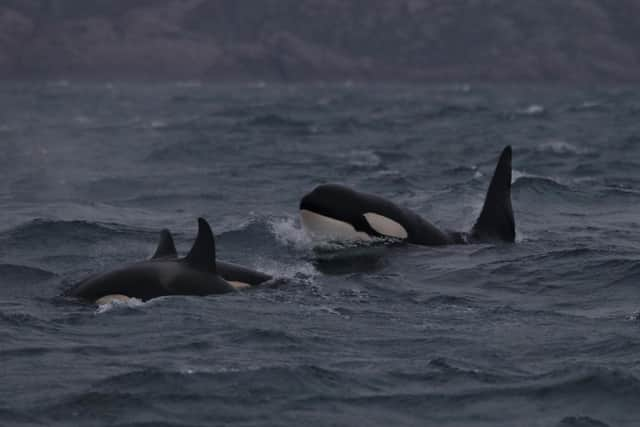Whales Scotland: Call for UK leaders to help end whale hunts as Scotland's pod of orcas predicted to die out within next few years
MPs from the environment, food and rural affairs committee say the country should use its 'soft power' in international trade or fisheries talks to put pressure on nations such as Norway, Japan, Iceland and the Faroe Islands, which still actively hunt whales and other sea mammals.
They are also calling for new laws to be introduced to close loopholes that allow meat or body parts from marine mammals caught elsewhere to be shipped through UK ports.
Advertisement
Hide AdAdvertisement
Hide AdBetter monitoring and reporting should also be implemented to help gauge the true scale of deaths through fishing bycatch, collisions with boats, pollution and other dangers, the report finds.
The report recommends all vessels should be fitted with cameras or have a physical observer aboard, suggesting the requirement could be phased-in over several years to allow smaller fishing boat operators and the like more time and, where necessary, financial support to meet the obligations.
Marine mammals are facing an unprecedented number of threats to their survival. Research suggests more than 650,000 die each year as a result of inadvertent trapping in fishing gear, although the true number is likely much higher.
Pollution, both from chemicals and plastic, is another big killer. The deaths of at least 300,000 dolphins, porpoises and whales are attributed to plastic annually.


Meanwhile, experts have warned Scotland’s own resident pod of orcas is likely to die out in the next few years due to high levels of toxic ‘forever chemicals’ in their systems, which are the likely cause of the family group’s failure to produce any surviving offspring in more than 25 years.
Underwater noise from the likes of drilling and blasting for offshore energy developments and deep-sea mining, explosions from military tests and sonar signals can also cause serious harm to sea creatures, which use sound waves to navigate.
There has also been an increase in shipping traffic across the world, raising the number of strike incidents. The impacts of climate change have led to food shortages and rising temperatures, making some traditional hunting and feeding grounds less habitable.
Despite it being illegal in most countries to hunt dolphins and whales, the practice still happens in many parts of the world – mostly for meat and body parts for use in traditional medicines and charms, but in some places animals are captured to be sold into captivity.
Advertisement
Hide AdAdvertisement
Hide AdProbably the most notorious – and bloody – hunts take place in Japan and the Faroe Islands, where dolphins and small whales are driven onto beaches or into coves and then killed.
MP Sir Robert Goodwill, chair of the committee, said: “We are rightly appalled when magnificent whales or defenceless seals are deliberately slaughtered. We can and should do more to stop this as we sign new post-Brexit trade deals worldwide.
“But snarling these beautiful creatures in fishing gear wreaks a far greater toll. Starting with the biggest boats, then moving to the smallest – giving the small operators time to adjust – we must stop this industrial-scale killing. We owe it to our generations to come.”
Comments
Want to join the conversation? Please or to comment on this article.